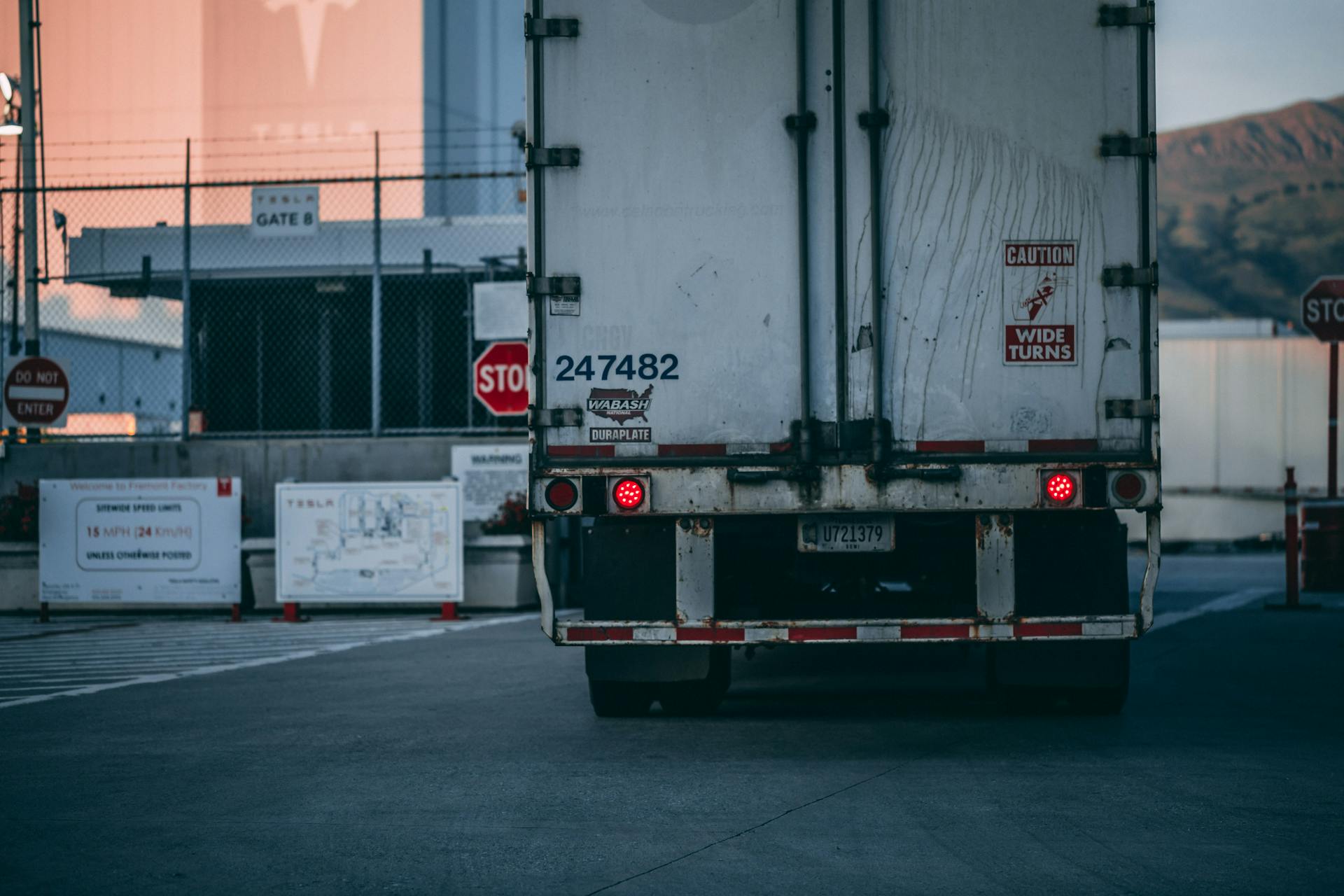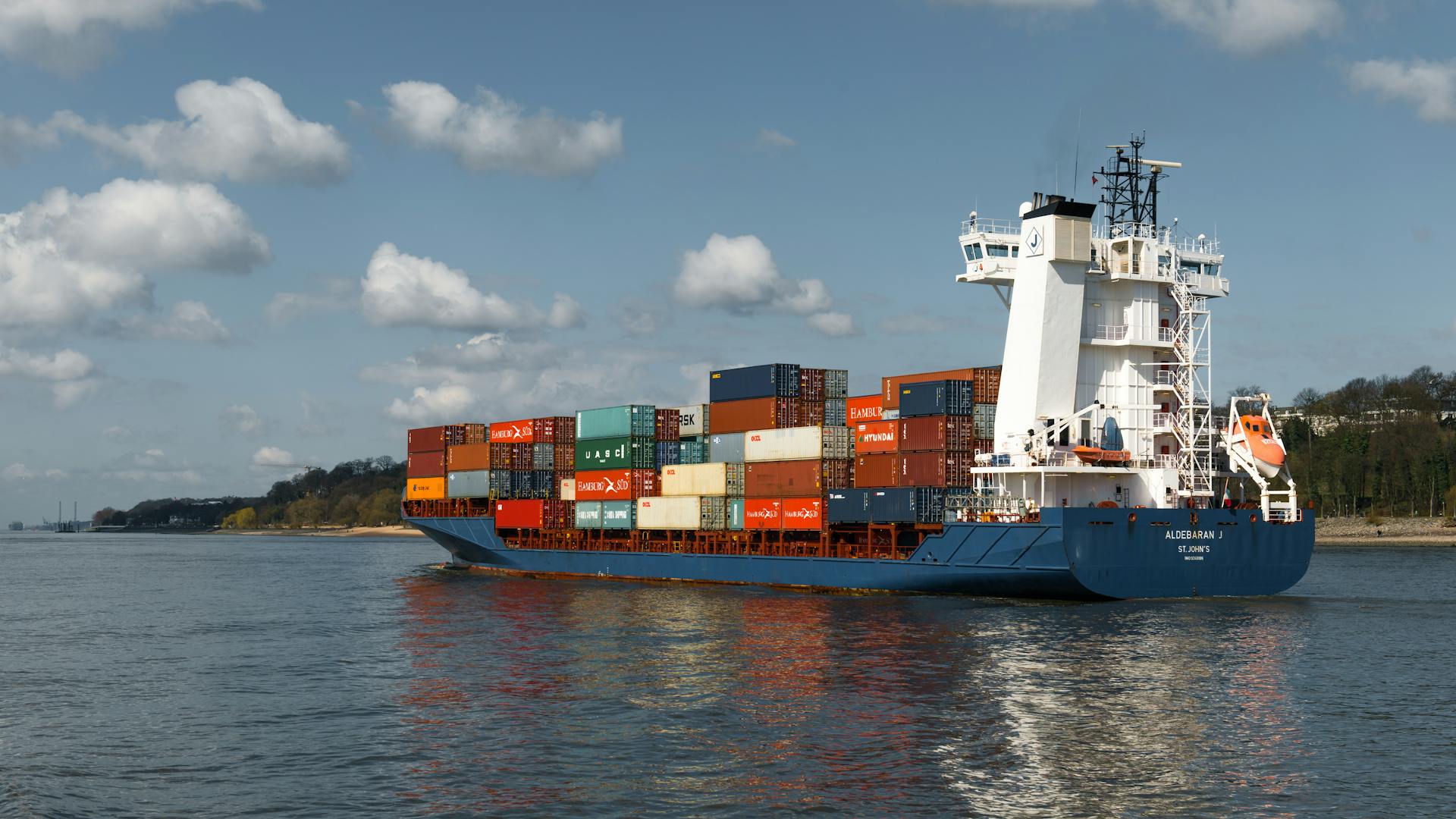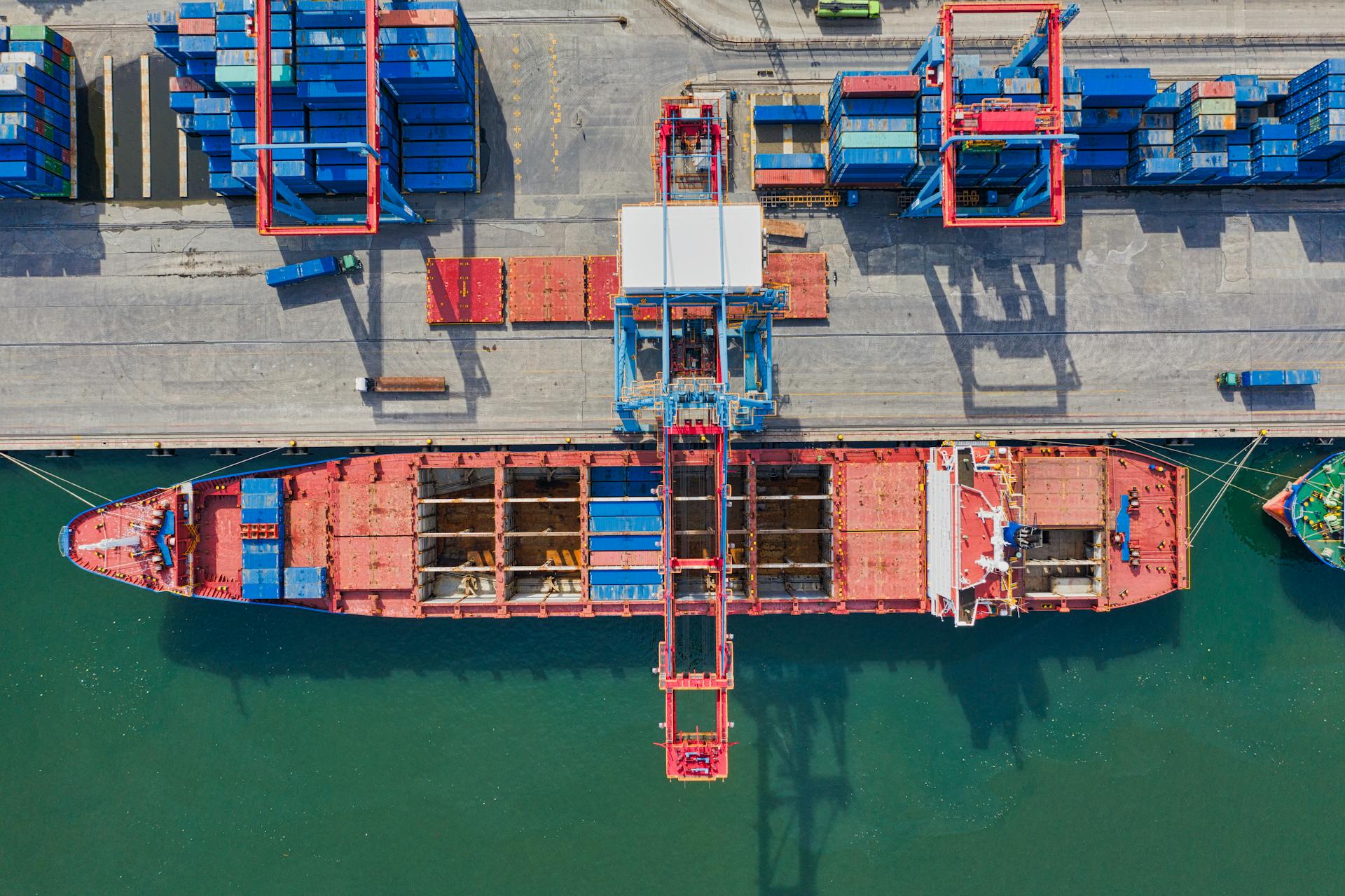
Freight insurance is a crucial aspect of the logistics industry, providing financial protection to shippers and carriers in case of loss or damage to goods during transportation.
Cargo insurance is a type of freight insurance that covers goods in transit, and it's often mandatory for high-value or specialized shipments.
There are several types of freight insurance, and understanding them is essential for making informed decisions when shipping goods.
All-risk insurance, for example, provides coverage for a wide range of risks, including natural disasters, theft, and accidents.
In contrast, named-peril insurance only covers specific risks that are listed in the policy, such as fire or water damage.
Types of Freight Insurance
There are several types of freight insurance to choose from, depending on your specific needs. These policies differ in what perils or causes of damage or loss they cover, and what types of loss or damage they will pay out for.
Some common types of freight insurance include Basic coverage, which offers the least amount of coverage and only covers limited perils. Named or specified perils coverage protects against specific types of hazards, risks, or perils outlined within the policy.
For more insights, see: Types of Perils in Insurance
The most comprehensive protection is offered by All-Risk coverage, which covers any damage or loss due to any external cause. This type of policy provides the broadest protection but also tends to be the most expensive.
Here are some of the most common types of freight insurance policies:
- Basic coverage: Covers limited perils, such as damage due to an accident or natural disaster.
- Named or specified perils coverage: Protects against specific types of hazards, risks, or perils outlined within the policy.
- Broad coverage: Offers more protection than basic or named coverage but not as much as all-risk coverage.
- All-risk coverage: Covers any damage or loss due to any external cause.
- Total loss-only coverage: Kicks in only when the entire shipment has been compromised rather than individual pieces or minor damage.
- Contingent coverage: A supplementary safety net for any coverage gaps in your primary insurance policy.
All-Risk Policies
All-Risk Policies provide the broadest protection, covering a wide range of risks. They are the most comprehensive option, but also tend to be the most expensive.
This type of policy covers all risks unless specifically excluded. For example, All-Risk insurance is also known as Institute Cargo Clause A, the broadest type of maritime insurance.
Common exclusions in All-Risk policies include inherent vice, negligence, WSRCC (war, strikes, riots, and civil commotions), loss of use/market, loss over policy limit, abandonment, customs rejections, and failure to pay/collect.
Some carriers offer additional insurance as an add-on to their policies, but it's essential to understand what type of insurance they're offering and how it may impact your overall coverage.
For more insights, see: What Are the Types of Risk in Insurance
Here are some common exclusions in All-Risk policies:
- Inherent Vice: objects deteriorated due to the product itself; its fundamental composition is naturally unstable.
- Negligence: packing negligence or deterioration of time-sensitive goods.
- WSRCC: “war, strikes, riots, and civil commotions.”
- Loss of Use/Market: loss of profits will not be covered, though the cost of goods will.
- Loss Over Policy Limit: there is a maximum conveyance limit, and losses over that will not be covered.
- Abandonment: cargo is abandoned at ports of entry.
- Customs Rejections: rejections of cargo at ports of entry
- Failure to Pay/Collect: loss due to nonpayment.
In some cases, external factors such as weather events are also excluded. Always check your policy to ensure that you have coverage, since weather events are the most common cause of loss during ocean shipments.
Air
Air freight is a fast and efficient way to transport goods, but it also comes with specific risks like airport handling and potential delays. Air freight insurance can protect against these risks and may also cover the costs of the air freight itself and associated charges.
Air freight insurance is a type of insurance that specifically addresses the risks associated with air freight. It can provide financial protection against losses due to airport handling and delays.
A fresh viewpoint: What Types of Litigation Does Umbrella Insurance Protect against
Land
Land cargo insurance protects your goods from theft, collision damage, fires, and more while being shipped via utility truck, semi, or train.
This type of coverage is only applicable when the goods are being shipped within the country, as moves over foreign land are often exempt.
You can get this coverage to safeguard your goods during domestic transportation, giving you peace of mind and financial protection in case of unexpected events.
It's essential to understand the limitations of land cargo insurance to ensure you're adequately covered for your specific shipping needs.
Broaden your view: Freight Broker Contingent Cargo Insurance Cost
Freight Insurance Coverage
Freight insurance policies can cover a range of risks, including loss, theft, physical damage, non-delivery of goods, infestation, and government seizure.
You'll want to read the fine print to understand what's covered and what's not. Some policies may protect against damage from natural disasters like hurricanes or tornadoes, but not delayed delivery due to weather-related events.
Most freight insurance policies have a maximum coverage limit, so it's essential to ensure your goods are worth the investment. The more expensive the goods, the higher the coverage limit you'll need.
If you're shipping high-value items, consider buying a policy with a higher coverage limit. You can also purchase "blanket" coverage for all your shipments, which can save you money if you ship frequently.
Here are some common types of freight insurance coverage:
- Loss
- Theft
- Physical damage, whether due to mishandling, accidents, or extreme weather
- Non-delivery of goods
- Infestation
- Government seizure
Some insurers specialize in shipping certain types of goods, so it's crucial to find one that offers coverage for the items you typically ship.
Freight Insurance Options
Cabrella insures your valuable cargo to 182 countries and offers extended protection for events and causes typically excluded from policies. This kind of protection can give you peace of mind when shipping goods abroad.
Carrier liability is based on several factors, including the transportation mode, the freight class your goods fall into, and the type of commodities you’re shipping. It's essential to understand these factors to determine your carrier's maximum liability.
Carrier liability coverage varies from one carrier to another, and you may find significant gaps in coverage with one carrier, while another offers most of the protections you’re looking for. Always check your carrier's liability before purchasing supplemental insurance.
Freight insurance bridges the gap between your carrier's liability and your own responsibility, covering the remaining cost if the value of the damaged or lost product exceeds the carrier's maximum liability.
You might enjoy: Self Employed Income Protection Insurance
Choosing Freight Insurance
Choosing freight insurance requires careful consideration of your business's specific needs. To select the ideal freight insurance, start by assessing your risks, which includes evaluating the types of goods you ship, your usual transport modes, routes, and destinations.
You should also check your carrier's liability and identify any gaps in protection. This will help you understand what risks and liabilities are already covered and what you need to fill the gaps. Consider getting the right level of cover, such as basic, broad, or all-risk, based on your specific needs and budget constraints.
To compare providers, look for reputable insurers with deep industry expertise, competitive rates, and strong customer support. Don't be afraid to shop around to find the best fit for your business.
What Is Carrier?
Carrier insurance is a type of insurance that covers the costs of shipping goods. It's typically used by businesses that ship large quantities of goods or high-value items.
Carrier insurance can cover the cost of damages or losses that occur during shipping, as well as the cost of delays or cancellations. It can also provide coverage for lost or stolen shipments.
Purchasing carrier insurance can protect your business from financial losses that occur when shipments are damaged or lost. This can be a huge relief for businesses that rely on timely and secure shipping.
For more insights, see: Fedex Shipping Insurance Cost
Carrier insurance can help cover the cost of delays or cancellations that may occur during shipping. This can give you peace of mind and help you plan for unexpected setbacks.
By purchasing carrier insurance, you can protect your business from the financial losses that can occur if something goes wrong during shipping. This is especially important for businesses that ship high-value items or large quantities of goods.
A different take: Best Third Party Shipping Insurance
How to Choose
To choose the right freight insurance for your business, start by assessing your risks. Evaluate the types of goods you typically ship, your usual transport modes, routes, and destinations. Identify any unique risks associated with your cargo or shipping processes.
It's also essential to check carrier liability, as this can impact the level of protection you need. See what risks and liabilities are covered by your carrier's insurance and identify any gaps in protection.
Consider the level of cover you need, ranging from basic to broad or all-risk cover. This will depend on your specific needs and budget constraints.
Check this out: Do I Need Comprehensive Insurance on an Old Car
When selecting a provider, look for reputable insurers with deep industry expertise, competitive rates, and strong customer support. Don't be afraid to shop around and compare quotes from different companies.
It's also crucial to review your insurance coverage regularly as your business evolves. Periodically review your policy to ensure it still meets your needs, and update as required.
Here's a summary of the key steps to choose the right freight insurance:
- Assess your risks
- Check carrier liability
- Get the right level of cover
- Compare providers
- Review regularly
Who Needs?
Who Needs Freight Insurance?
Many risk managers now require cargo insurance from truckers, especially those using box trucks, cargo vans, flatbeds, car haulers, and tractor-trailers.
If you're a for-hire trucking operation, you'll likely need cargo coverage to meet these requirements.
You can also consider cargo insurance if you ship high-value items, as the cost of repairs or replacement can be significant.
Some insurers specialize in shipping certain types of goods, so it's essential to find one that offers coverage for the items you typically ship.
To make an informed decision, read reviews of different insurance companies to get an idea of their customer service and claims processing.
Here are some common types of vehicles that commonly need cargo coverage:
- Box trucks
- Cargo vans
- Flatbeds
- Car haulers
- Tractor-trailers
Why Choose GEICO?

GEICO offers competitive rates, making it a smart choice for your freight insurance needs.
They have the resources and capability to handle and pay claims quickly, which is crucial for businesses that rely on timely payments.
You can add an endorsement for motor truck cargo coverage to your commercial auto policy with GEICO.
Call (866) 509-9444 to learn more about GEICO's freight insurance options or visit their website to request a free insurance quote today.
Freight Insurance Costs and Exclusions
Freight insurance costs can vary depending on several factors, including the value of the goods being shipped, the shipping route, and the insurance company's rates and policies. Generally, freight insurance costs between 1% and 0.3% to 0.5% of the commercial invoice value of the goods.
To give you a better idea, here are some general guidelines on freight insurance costs:
It's also essential to note that certain scenarios may be excluded from your freight insurance coverage, such as poor packaging, inaccurate labeling, normal wear and tear, and shipment and delivery delays. Additionally, specific goods like weapons, alcohol, precious metals, and electronics may not be covered by freight insurance.
Cost
Freight insurance costs can vary depending on several factors, including the value of the goods being shipped, shipping route, and insurance company's rates and policies.
Generally, freight insurance costs between 1% and 2% of the value of the goods being shipped, with some estimates as low as 0.3% to 0.5% of the commercial invoice value.
The type and value of goods being shipped, mode of transport, destination country, and shipping route all impact the cost of freight insurance.
For example, shipping expensive or high-risk goods will increase the cost of insurance.
On average, freight insurance premiums cost around 0.3% to 0.5% of the commercial invoice value of the goods.
To keep freight insurance costs down, consider properly packing and labeling your cargo, providing accurate declarations and documentation, choosing reputable carriers, and opting for appropriate levels of cover.
The cost of freight insurance also depends on the level of cover selected, with more comprehensive coverage costing more.
For more insights, see: Which Type of Life Insurance Policy Generates Immediate Cash Value
Here are some factors that influence the pricing of your cargo insurance premium:
Coverage limits also affect the cost of cargo insurance, with higher coverage limits increasing the premium.
Your past claims and losses can also impact the cost of cargo insurance, with insurance providers assessing your history when calculating your coverage cost.
Discover more: Average Cost of Life Insurance with Long Term Care Rider
Common Exclusions
Poor packaging of your goods can void your freight insurance coverage, so make sure to properly secure your shipment.
Inaccurate labeling of your shipment can also lead to exclusions, so double-check the details before shipping.
Normal wear and tear incurred during the shipment process is typically excluded from coverage.
Shipment and delivery delays are often excluded from freight insurance policies.
Certain goods are also excluded from coverage, including:
- Weapons and ammunition
- Alcohol
- Precious metals and gemstones
- Artwork and antiques
- Tobacco products
- Traded metals
- Electronics
- Pharmaceuticals
Some policies may not cover specific vehicle types, such as limousines, buses, and ice cream trucks.
Additionally, exclusions apply to certain cargo types, including:
- Valuables (precious and semi-precious metals and stones, art, jewelry, money, or valuable papers or documents)
- Restricted substances (marijuana, contraband, pharmaceuticals, tobacco, and alcohol)
- Live animals
- Mobile and modular homes
It's essential to review your policy and understand what is covered and not covered to avoid any surprises.
Sources
- https://www.freightrun.com/freight-insurance
- https://www.freightos.com/freight-resources/freight-insurance/
- https://www.flockfreight.com/blog/understanding-freight-shipping-insurance-a-comprehensive-guide
- https://www.ecabrella.com/blog-posts/types-of-cargo-insurance
- https://www.geico.com/commercial-auto-insurance/truck-insurance/cargo-insurance/
Featured Images: pexels.com

